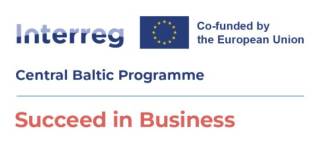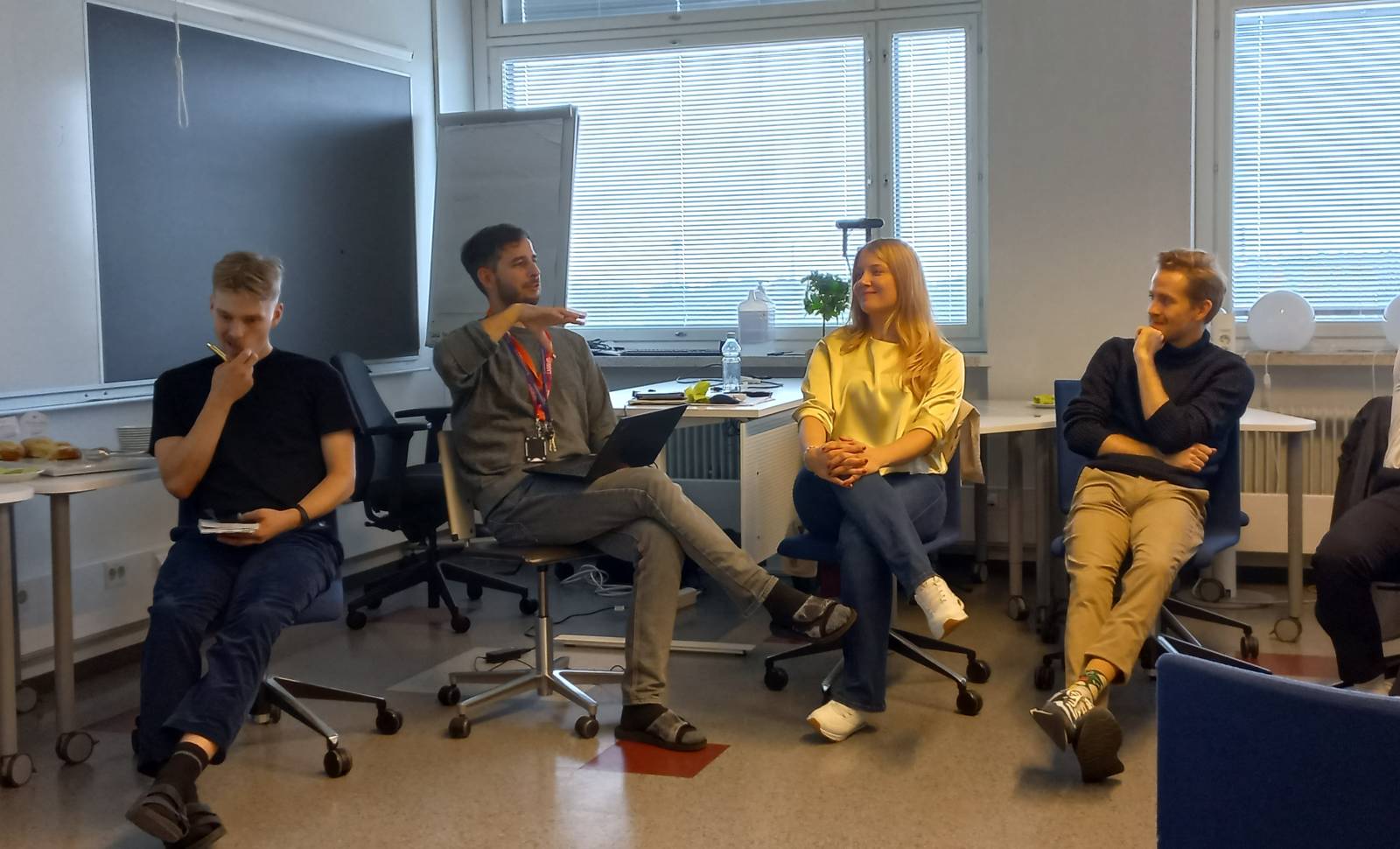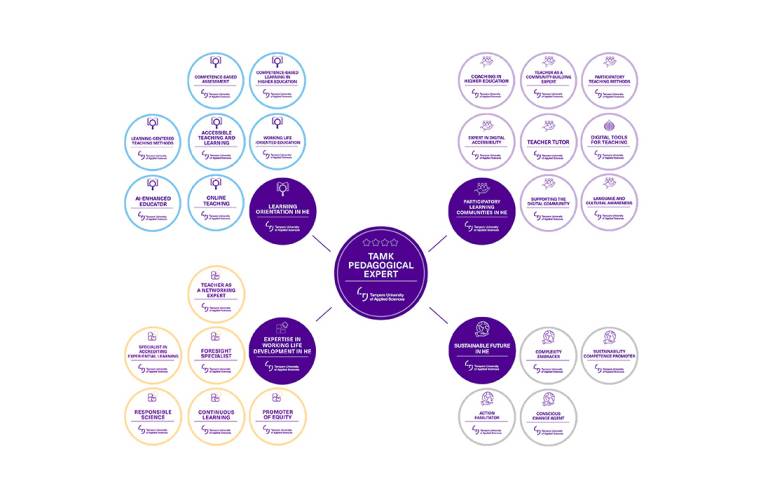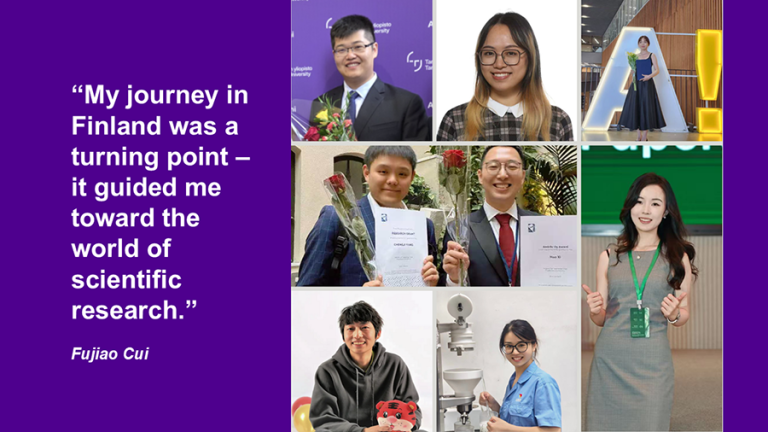Young adults should have access to a wide range of professional options and career opportunities. In almost every profession and job, it is beneficial to understand entrepreneurship and the management and operation of an organisation. In the Succeed in Business project, Tampere University of Applied Sciences together with Latvia University of Life Sciences and Technologies (Latvia) and Association of Municipalities of Tartu County (Estonia) offer young adults the opportunity to explore entrepreneurship and develop their own business skills twice (2024-2025, 2025-2026) through a year-long training. At the same time, entrepreneurship education students network with participants from different countries and create new international contacts.
At the Awareness Rising Conference held on 24.9.2024, participants were inspired to embark on the path of entrepreneurship by Christian Burr Raty, who told his own story from a young guy from Chile to an entrepreneurial coach, i.e. pushing technical ideas and innovations through setbacks towards success. As observations of the story, the conference participants highlighted the right contacts and networks, perseverance and passion for their own topic as important things in the story.
In the panel discussion, we heard the thoughts of three entrepreneurs at the beginning of their own entrepreneurship. Ella Karvinen, (Reilumpaatyoelamaa.com), Tommi Riikonen (Kaius-vaate, paitafirma) and Felix Schwarz-Pajunen (Ruuan kasvot -project) discussed how they have found their field, how they have found a need that their expertise and/or product meets, and how they have managed to make the company flourish since the beginning. It was great to see how the panelists wanted to share what they had learned and thus act as mentors for young adults interested in entrepreneurship. The experiences of the entrepreneurs provided good guidance for the contents of the Succeed in Business training.
Entrepreneurship must be possible for everyone
The participants of the Awareness Ricing Conference shared their thoughts and experiences of entrepreneurship in a joint discussion. Some of the participants came from entrepreneurial families, but most had no previous experience of entrepreneurship in their immediate circle. The panellists’ examples of how even a child of a non-entrepreneur family can grow into an entrepreneur was encouraging. Experiences were also shared of failed entrepreneurial stories and challenges to embark on the path of entrepreneurship.
As stated in the background to the project: Running a business appears a feasible alternative for young people. However, this path is also associated with a number of challenges. For example, young adults may suffer from a mismatch between skills they have and skills needed. Lack of hands-on experience along with a vague understanding of how a company functions does not allow them to establish sustainable businesses with a growth potential. At the same time, current business environment influenced by Covid crisis and recent geopolitical events calls for flexible, resilient and effective enterprises. (Succeed in business project application.)
All in all, it is important that challenges like high unemployment among young people and a lower-income family background do not become an obstacle to learning entrepreneurship and starting one’s own business. Research (Kõiv et al. 2022; Looney & Santibañez 2021; Paaso &; Maunu 2022; Rannala & Dibou 2020; Ravenscroft 2022; Villardón-Gallego et al. 2020.) shows that a non-formal learning environment and learning methods can better promote the development and recognition of young people’s skills (including those of NEETs). Flexible learning environments and the sense of community that forms there also contribute to this (Kõiv et al. 2022; Looney & Santibañez 2021; Paaso & Maunu 2022; Rannala & Dibou 2020; Ravenscroft 2022; Villardón-Gallego et al. 2020.) The Succeed in Business project encourages various young adults to boldly participate in the project’s entrepreneurship education.
Opportunities must be seised
Almost all of the conference participants signed up for the Succeed in Business training and a year-long joint journey to entrepreneurship and international networking. During the training, the project gives participants the opportunity to travel twice to Latvia and twice to Estonia to meet face to face and work with participants from other countries. Also in Finland, we meet twice during the training in Tampere, and the participants have the opportunity to make contacts here with various entrepreneurs and companies. Travel and internationality are also important reasons for many participants to participate in the training.
The first year of training will involve 17 participants, who will start their journey together at the Kick-off Conference in Riga in November 2024. During the training, everyone reflects on their own relationship with entrepreneurship, and everyone starts from their own starting point and situation to develop further. The training methods are 1) “Look around and think big”, 2) “More practice, less theory”, 3) “Learn from practitioners” and 4) “Teamwork is a priority” (Succeed in business project application). It is hoped that these slogans will also carry the participants to start and continue their own path to entrepreneurship and seize the opportunities that open up.
Author: Päivi Heimonen, Principal Lecturer, Applied Research Center, TAMK
Photo: Päivi Heimonen
References
Kõiv, K., Saks, K., Paabort, H., Lendzhova, V., & Smoter, M. (2022). A Service Model for Self-Directed Learning of NEET Youth at the Local Government Level. Youth & Society, 54(2_suppl), 52S-68S. Viitattu 1.11.2024. https://doi.org/10.1177/0044118X211058225
Looney, J. & Santibañez, B. 2021. Validation of non-formal and informal learning to support disadvantaged learners: Alternative assessments. European Journal of Education, 56 (3), 439–453. Viitattu 1.11.2024. https://doi-org.libproxy.tuni.fi/10.1111/ejed.12469
Paaso, L. & Maunu, A. 2022. Osaamisidentiteetin rakennusaineksia: Ammattiin opiskelevien nuorten tulevaisuuskuvia tutkimassa. Sosiaalipedagogiikka, 23(1), 41–70. Viitattu 1.11.2024. https://doi.org/10.30675/sa.103014
Rannala, I.-E. & Dibou, T. 2020. Non-formal learning in youth work: Questions and examples inspired from Estonian youth work. Youth Voice Journal, Jan2020, p.2-24. Viitattu 1.11.2024. http://libproxy.tuni.fi/login?url=https://search.ebscohost.com/login.aspx?direct=true&AuthType=cookie,ip,uid&db=sxi&AN=148296785&site=ehost-live&scope=site
Ravenscroft, A. 2022. Participatory internet radio (RadioActive101) as a social innovation and co-production methodology for engagement and non-formal learning amongst socially excluded young people. International Journal of Inclusive Education, 26 (6), 541-558. Viitattu 1.11.2024. https://doi-org.libproxy.tuni.fi/10.1080/13603116.2019.1700312
Succeed in Business Project application, 2023. Latvia University of Life Sciences and Technologies (Latvia), Association of Municipalities of Tartu County (Estonia) & Tampere University of Applied Sciences (Finland). Interreg, Co-funded by the European Union.
Villardón-Gallego, L., Flores-Moncada, L., Yáñez-Marquina, L. & García-Montero, R. 2020. Best Practices in the Development of Transversal Competences among Youths in Vulnerable Situations. Education Sciences, 10(9), 230. Viitattu 1.11.2024. https://doi.org/10.3390/educsci10090230






